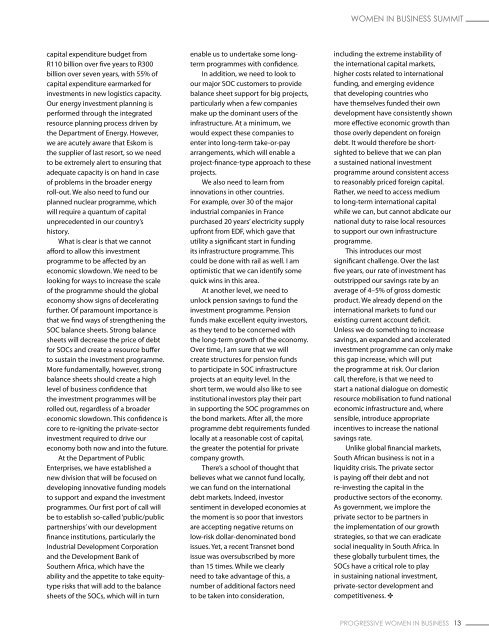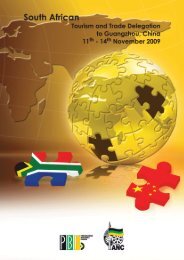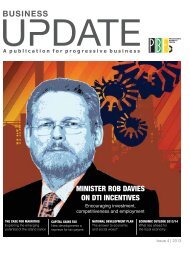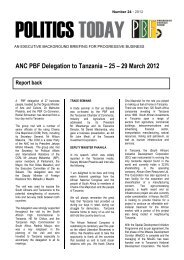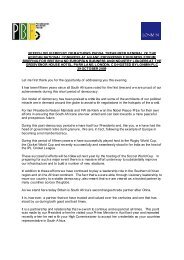SAFARI - the Progressive Business Forum website
SAFARI - the Progressive Business Forum website
SAFARI - the Progressive Business Forum website
- No tags were found...
You also want an ePaper? Increase the reach of your titles
YUMPU automatically turns print PDFs into web optimized ePapers that Google loves.
WOMEN IN BUSINESS SUMMITcapital expenditure budget fromR110 billion over five years to R300billion over seven years, with 55% ofcapital expenditure earmarked forinvestments in new logistics capacity.Our energy investment planning isperformed through <strong>the</strong> integratedresource planning process driven by<strong>the</strong> Department of Energy. However,we are acutely aware that Eskom is<strong>the</strong> supplier of last resort, so we needto be extremely alert to ensuring thatadequate capacity is on hand in caseof problems in <strong>the</strong> broader energyroll-out. We also need to fund ourplanned nuclear programme, whichwill require a quantum of capitalunprecedented in our country’shistory.What is clear is that we cannotafford to allow this investmentprogramme to be affected by aneconomic slowdown. We need to belooking for ways to increase <strong>the</strong> scaleof <strong>the</strong> programme should <strong>the</strong> globaleconomy show signs of deceleratingfur<strong>the</strong>r. Of paramount importance isthat we find ways of streng<strong>the</strong>ning <strong>the</strong>SOC balance sheets. Strong balancesheets will decrease <strong>the</strong> price of debtfor SOCs and create a resource bufferto sustain <strong>the</strong> investment programme.More fundamentally, however, strongbalance sheets should create a highlevel of business confidence that<strong>the</strong> investment programmes will berolled out, regardless of a broadereconomic slowdown. This confidence iscore to re-igniting <strong>the</strong> private-sectorinvestment required to drive oureconomy both now and into <strong>the</strong> future.At <strong>the</strong> Department of PublicEnterprises, we have established anew division that will be focused ondeveloping innovative funding modelsto support and expand <strong>the</strong> investmentprogrammes. Our first port of call willbe to establish so-called ‘public/publicpartnerships’ with our developmentfinance institutions, particularly <strong>the</strong>Industrial Development Corporationand <strong>the</strong> Development Bank ofSou<strong>the</strong>rn Africa, which have <strong>the</strong>ability and <strong>the</strong> appetite to take equitytyperisks that will add to <strong>the</strong> balancesheets of <strong>the</strong> SOCs, which will in turnenable us to undertake some longtermprogrammes with confidence.In addition, we need to look toour major SOC customers to providebalance sheet support for big projects,particularly when a few companiesmake up <strong>the</strong> dominant users of <strong>the</strong>infrastructure. At a minimum, wewould expect <strong>the</strong>se companies toenter into long-term take-or-payarrangements, which will enable aproject-finance-type approach to <strong>the</strong>seprojects.We also need to learn frominnovations in o<strong>the</strong>r countries.For example, over 30 of <strong>the</strong> majorindustrial companies in Francepurchased 20 years’ electricity supplyupfront from EDF, which gave thatutility a significant start in fundingits infrastructure programme. Thiscould be done with rail as well. I amoptimistic that we can identify somequick wins in this area.At ano<strong>the</strong>r level, we need tounlock pension savings to fund <strong>the</strong>investment programme. Pensionfunds make excellent equity investors,as <strong>the</strong>y tend to be concerned with<strong>the</strong> long-term growth of <strong>the</strong> economy.Over time, I am sure that we willcreate structures for pension fundsto participate in SOC infrastructureprojects at an equity level. In <strong>the</strong>short term, we would also like to seeinstitutional investors play <strong>the</strong>ir partin supporting <strong>the</strong> SOC programmes on<strong>the</strong> bond markets. After all, <strong>the</strong> moreprogramme debt requirements fundedlocally at a reasonable cost of capital,<strong>the</strong> greater <strong>the</strong> potential for privatecompany growth.There’s a school of thought thatbelieves what we cannot fund locally,we can fund on <strong>the</strong> internationaldebt markets. Indeed, investorsentiment in developed economies at<strong>the</strong> moment is so poor that investorsare accepting negative returns onlow-risk dollar-denominated bondissues. Yet, a recent Transnet bondissue was oversubscribed by morethan 15 times. While we clearlyneed to take advantage of this, anumber of additional factors needto be taken into consideration,including <strong>the</strong> extreme instability of<strong>the</strong> international capital markets,higher costs related to internationalfunding, and emerging evidencethat developing countries whohave <strong>the</strong>mselves funded <strong>the</strong>ir owndevelopment have consistently shownmore effective economic growth thanthose overly dependent on foreigndebt. It would <strong>the</strong>refore be shortsightedto believe that we can plana sustained national investmentprogramme around consistent accessto reasonably priced foreign capital.Ra<strong>the</strong>r, we need to access mediumto long-term international capitalwhile we can, but cannot abdicate ournational duty to raise local resourcesto support our own infrastructureprogramme.This introduces our mostsignificant challenge. Over <strong>the</strong> lastfive years, our rate of investment hasoutstripped our savings rate by anaverage of 4–5% of gross domesticproduct. We already depend on <strong>the</strong>international markets to fund ourexisting current account deficit.Unless we do something to increasesavings, an expanded and acceleratedinvestment programme can only makethis gap increase, which will put<strong>the</strong> programme at risk. Our clarioncall, <strong>the</strong>refore, is that we need tostart a national dialogue on domesticresource mobilisation to fund nationaleconomic infrastructure and, wheresensible, introduce appropriateincentives to increase <strong>the</strong> nationalsavings rate.Unlike global financial markets,South African business is not in aliquidity crisis. The private sectoris paying off <strong>the</strong>ir debt and notre-investing <strong>the</strong> capital in <strong>the</strong>productive sectors of <strong>the</strong> economy.As government, we implore <strong>the</strong>private sector to be partners in<strong>the</strong> implementation of our growthstrategies, so that we can eradicatesocial inequality in South Africa. In<strong>the</strong>se globally turbulent times, <strong>the</strong>SOCs have a critical role to playin sustaining national investment,private-sector development andcompetitiveness. ✥<strong>Progressive</strong> women in business 13


